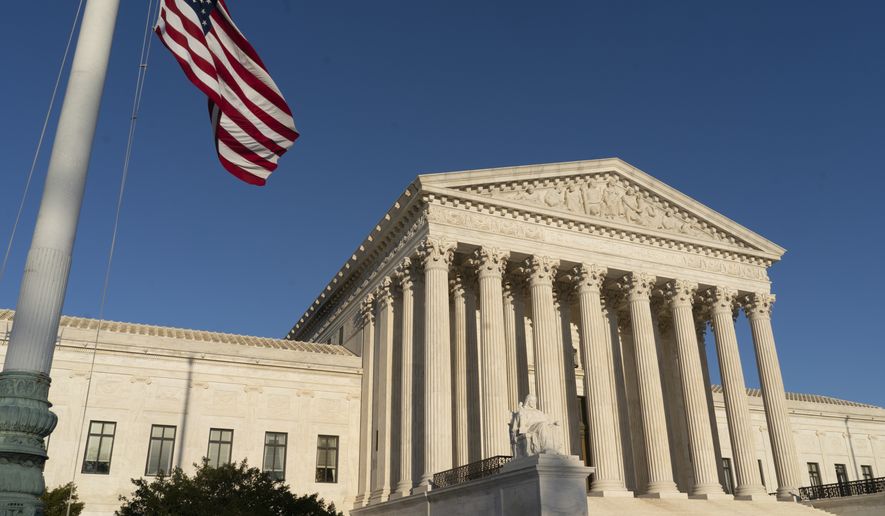The Supreme Court declined Tuesday to hear a case challenging Arkansas’ restrictions on medication-induced abortions, effectively clearing a path for the law to take effect while lower courts continue to spar over whether the rules are too strict.
Pro-life groups cheered the decision while pro-choice groups said it marked a major setback, and warned Arkansas could end up with just a single functioning clinic offering surgical abortions, if two others that offer medication abortions close.
Planned Parenthood had already begun telling patients Tuesday that it could no longer offer them medication abortions.
The justices didn’t comment on why they declined to hear the case, and legal scholars warned not to read too much into the decision, which returns the challenge to the 8th U.S. Circuit Court of Appeals.
That appeals court had ruled the law could go into effect, though it put its ruling on hold while the justices decided whether to take the case. Analysts said they expect the 8th Circuit to dissolve that hold, allowing the law to quickly take effect.
“Protecting the health and well-being of women and the unborn will always be a priority. We are a pro-life state and always will be as long as I am attorney general,” said Arkansas Attorney General Leslie Rutledge, whose office has defended the law.
Medication abortions occur during the first trimester and have been used by Planned Parenthood clinics for more than a decade. The abortion occurs after a pregnant person takes two oral pills.
Arkansas’ law doesn’t ban the use of the pills, but requires abortion providers who issue the pills to sign a contract with a doctor who has admitting privileges to a nearby hospital in case of emergency complications.
It was enacted in 2015 as part of a broader set of restrictions on abortion access, similar to laws in other conservative-leaning states.
The Arkansas Legislature pointed to research concluding that complications from medication abortions had led to eight deaths and hundreds of blood transfusions, hospitalizations and infections.
Planned Parenthood of Arkansas and Eastern Oklahoma sued, arguing the law would halt operations at two of the state’s remaining three abortion clinics. The organization said that would force women to drive hundreds of miles to obtain legal abortions.
“Arkansas is now shamefully responsible for being the first state to ban medication abortion. This dangerous law immediately ends access to safe, legal abortion at all but one health center in the state. If that’s not an undue burden, what is?” said Dawn Laguens, executive vice president of Planned Parenthood Federation of America.
A district judge agreed and initially blocked the law, saying it created too many hurdles for women. The 8th Circuit, though, erased that ruling, with the appeals court judges saying the lower court didn’t do enough to prove the burden. Specifically, the district judge didn’t estimate how many women would have to travel increased distances, nor calculate how many would likely delay an abortion or forgo one altogether, the appeals court said.
The case could come back to the Supreme Court after the lower courts sort out those issues.
“It is not as though the court is endorsing the 8th Circuit’s approach, just choosing not to review it at this time,” said I. Glenn Cohen, a law professor at Harvard University.
Tuesday’s refusal also doesn’t tip the justices’ hand about what would happen then, said Rachel Rebouche, a law professor at Temple.
“I don’t think the court’s decision today influences the balancing approach set out in Whole Woman’s Health. A new opinion by the 8th [Circuit] might and might mean that the case will come before the [Supreme Court] again,” she said.
The last major abortion case to reach the justices was in 2016, when the high court batted down a Texas law that also required doctors performing abortions to have admitting privileges in hospitals no more than 30 miles from the abortion facility.
Texas would have closed roughly half of their abortion clinics if the law had remained in place.
The justices, in a 5-3 ruling known as Whole Woman’s Health v. Hellerstedt, said the state law would have created a major burden on many women’s right to an abortion.
The Arkansas controversy, while it has similarities to Texas’s law, centers on a particular type of abortion.
Kristi Hamrick, spokesperson for Students for Life of America, said the law provides for common sense health and safety standards.
“Abortion vendors complain that holding them accountable for their sloppy standards might result in some clinics closing, which just goes to illustrate how anti-woman the abortion industry really is,” Ms. Hamrick said.
• Alex Swoyer can be reached at aswoyer@washingtontimes.com.




Please read our comment policy before commenting.